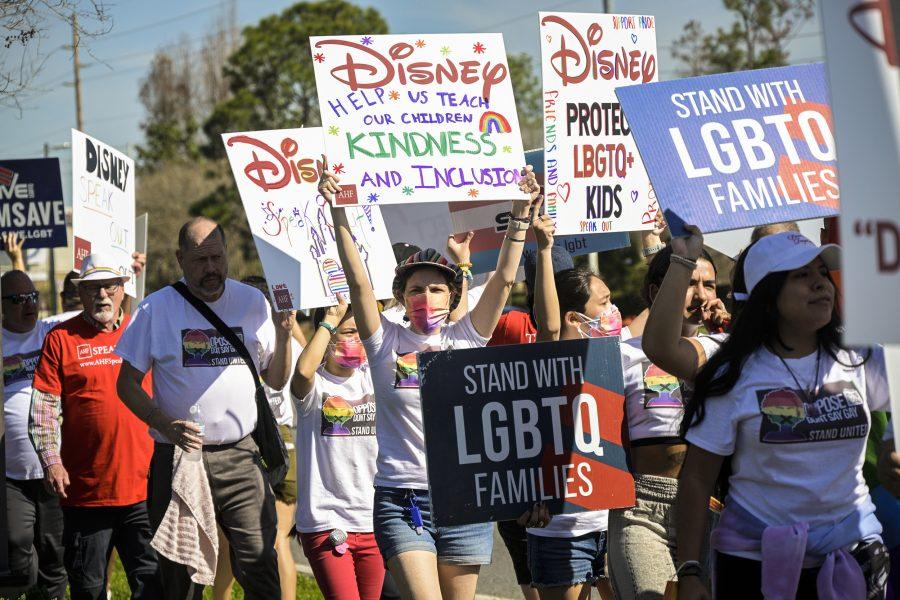On March 22, Walt Disney Co. employees participated in a nationwide walkout in protest of Disney CEO Bob Chapek’s response to, or lack of, Florida’s “Don’t Say Gay” bill. While advocacy such as the walkout and other protests sparked Disney and its leaders to publicly denounce the bill and encourage change within the company, one has to question whether or not these changes were due to their stance against the bill or just the fear induced by the public.
Disney’s sudden vocal change can be compared to different companies calling themselves allies of the LGBTQ+ community, commercializing and profiting off of pride-themed products during Pride Month, but doing very little to actually support the community that they profit from. Companies must do more than reactionary or seasonal support for the communities that they claim to be allies for and show true allyship in all aspects of their businesses.
After the walkout, Disney executive Karey Burke has promised to make at least 50% of their regular characters part of a marginalized group, whether it’s from the BIPOC or queer communities, by the end of the year in an effort to increase representation in their media. However, this quota feels forced, a response to public scrutiny rather than a genuine attempt to help the marginalized communities they hope to represent. Additionally, Chapek said that Disney is “reassessing our approach to advocacy,” including their past donations to specific anti-LGBTQ+ politicians in Florida.
Still, this begs the question: Would they have stayed silent if not forced to publicize their opinion?
Organizers of the Disney Walkout have even claimed that Disneyland Cast Members who did not feel safe participating in the walkout were told they couldn’t wear pride/trans Mickey pins to show their support. Disney has yet to explain this allegation as well as its starking and homophobic contrasts to their statements of inclusion.
In the same breath, companies such as FedEx, Comcast, and even Pfizer have identified themselves to be allies of the LGBTQ+ communities but have donated millions to anti-gay politicians. This apparent marketing strategy seems to be a trend in an attempt to appeal to progressive audiences without enacting any significant changes to the company’s morals and policies.
Selling pride-themed items, tweeting about Pride Month, or changing their profile picture on Instagram to a rainbow flag holds little significance unless that company actually does what they say. Words mean absolutely nothing if anti-gay legislature, such as the “Don’t Say Gay” bill in Florida, keeps being passed and queer individuals are constantly being targets. Actions do speak louder than words, and in this case, inaction speaks volumes.
Let’s face it. On the same note, pride-themed merchandise does not only feel disingenuous but also looks horrific. Companies constantly produce horrible-looking merchandise and pass them off as “Pride Merch,” but they also end up missing the whole point of allyship: being a supporter of the community. GLAAD President Sarah Kate Ellis said it best when she argued that companies should do more meaningful internal work before waving around a rainbow flag.
“You cannot just market to our community,” Ellis said. “You have to join the movement, and that’s a social justice movement. You need to speak out when there is bad legislation, especially when you have outsized influence.”
Disney, and companies like it, have such a powerful and influential platform on politics and social issues. As arguably the most well-known company on the planet, it is irresponsible of them to believe that taking a silent stance against the bill would be more beneficial than voicing their company’s stance publicly. They have the ears of parents, politicians, and even other companies and still chose to wait until public uproar to release any statements denouncing the bill.
It should be noted that other companies such as Target, McDonald’s, and Nike have made donations to LGBTQ+ charities and organizations, not just selling pride-themed merchandise but also using their platform and power to support the community itself. Starbucks, Nordstrom, and Pinterest were also part of the 45 companies that signed a two-year petition condemning anti-LGBTQ+ legislation. While these companies are far from perfect, they have acted in the protection of the queer community instead of reacting to public outrage as Disney did, displaying more allyship than some businesses could say they do.
Companies need to finally realize that the queer community is not a marketing strategy. No matter how much pride merchandise these companies produce, there is no meaning behind it if they do not live up to the morals that they imply that they do. The LGBTQ+ community isn’t a product that you can sell. The activism, the history, and the culture behind the queer community are constantly being attacked and by staying silent, or worse, by supporting anti-queer legislature, these companies are being complicit in the erasure and antagonization of the community that they oftentimes profit from.
Photo courtesy of NBC.
















